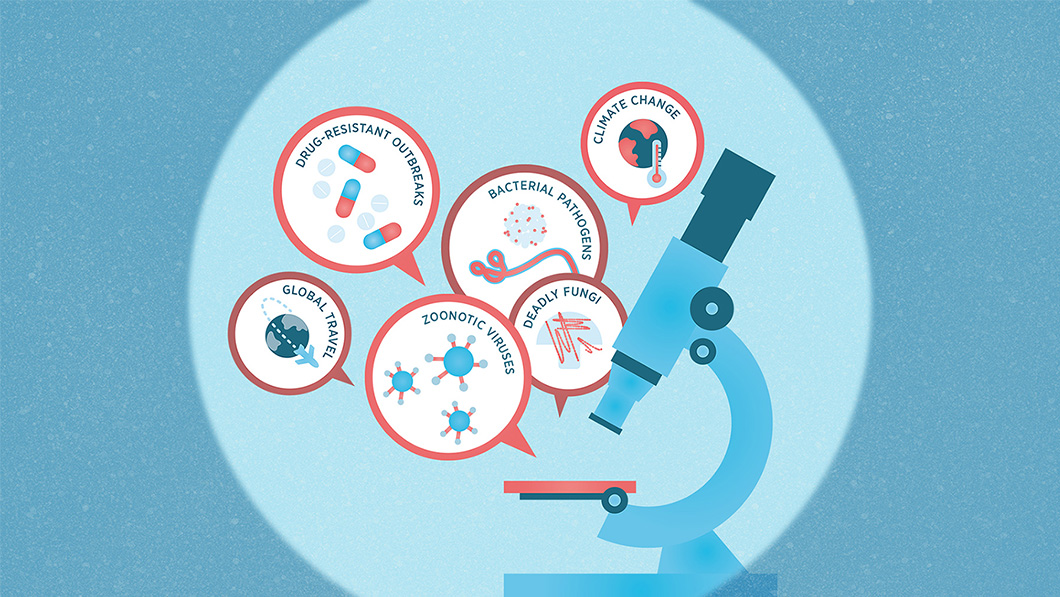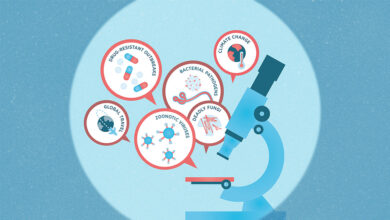
Avian flu in milk, and AI in nursing
Sponsored by:

PPF: Health Security
PPF’s report The Next One: Preparing Canada for another health emergency outlines the lessons learned from the pandemic and how Canada can safeguard against future health emergencies. To keep the discussion going — and to keep Canadians informed — this newsletter looks at what’s happening in the world of health security each week. Here’s what we’re following:
H5N1 widespread
A veterinary epidemiologist from Ohio State University recently collected 150 commercial milk products from around the midwestern U.S. – representing dairy processing plants in 10 different states, including somewhere dairy cattle have tested positive for H5N1. Genetic testing revealed viral RNA present in 58 of the samples, according to STAT News.
The results suggest that H5N1 is likely far more prevalent across the U.S. than has been officially recognized. The testing followed news that the FDA found remnants of bird flu in samples of pasteurized milk it had tested, though the agency stressed that it had “seen nothing that would change our assessment that the commercial milk supply is safe.”
The FDA says that, based on previous data that underpin its pasteurization requirements, the pasteurization process is “very likely to effectively inactivate heat-sensitive viruses, like H5N1, in milk from cows and other species” – but it continues to conduct research to confirm.
Meanwhile, the U.S. Department of Agriculture issued an order that, starting Monday, dairy cattle moving between states will be tested for avian flu and will require a negative result. Colombia became the first country to announce that it’s restricting beef imports and beef products from U.S. states where cattle have tested positive for avian flu. To date, avian flu has not been detected in Canadian livestock, according to the most recent update from the Canadian Food Inspection Agency.
THIS WEEK ON WONK: ‘The fascinating economist’ Craig Wright, on the role of big bank forecaster
Wrong answers only
Only a few weeks after launch, the WHO’s AI-powered health chatbot is being accused of generating inaccurate answers to people’s health-related queries. The bot, nicknamed SARAH (Smart AI Resource Assistant for Health) is designed to educate and provide users guidance on general health issues – but is designed to stick to topics within the WHO’s purview, rather than generate more comprehensive answers or diagnoses.
But because SARAH was trained on ChatpGPT 3.5 – that is, on data from prior to 2021 – it’s unable to provide the most current information. Additionally, “the bot occasionally provides bizarre answers, known as hallucinations in AI models, that can spread misinformation about public health,” Bloomberg reported. Bloomberg asked SARAH if the FDA had approved an Alzheimer’s drug; the bot said no – which was incorrect. It also struggled to site details from a recent WHO report and drew a blank on simple questions like, where to get a mammogram in Washington, DC. In SARAH’s defence, it is still a prototype.
New WHO network
The WHO Europe launched the Pan-European Network for Disease Control (NDC) alongside the UK Health Security Agency (UKHSA), which will play the role of host for the new network. The NDC was included as a recommendation in the 2021 Monti Commission on lessons learned from COVID-19 as a way to bolster preparedness across 53 countries in Europe and Asia against potential risks before they become regional or global threats.
The purpose of the NDC is to facilitate collaboration, as well as information and expertise sharing, promote common standards to approach disease management, and improve coordination among multiple jurisdictions.
“The pandemic laid bare the weaknesses in our regional and global health architecture. Hasty reactions not informed by science led to border closures, vaccine hoarding and inadequate sharing of health data,” Dr Hans Henri P. Kluge, WHO Regional Director for Europe said on the NDC’s launch. “Our political and health systems were simply not equipped to deal with a pandemic of this size and severity. The next pandemic or global health emergency could be even worse, so we must prepare for it now.”
This week also marks the start of the last round of negotiations on a new international pandemic agreement. While issues persist around equitable access, the latest draft of the agreement showed improvement. “Rather than simply [covering] the equitable sharing of benefits that arise from the use of pathogen samples and sequences generally, the latest text ties the use to the products more specifically,” Alexandra Phelan of the Johns Hopkins Center for Health Security said last week.
READ MORE: A glaring omission in Canada’s health security defences
Nervous nurses
Members of the California Nurses Association (CNA) have protested Kaiser Permanente’s implementation of AI in health care, saying it undermines their jobs and puts patients at risk. “What we are witnessing in our hospitals is the degradation and devaluation of our nursing practices through the use of these untested technologies,” the CNA president said in a statement. “No computer, no AI can replace a human touch,” a nurse told NBC News. “It cannot hold your loved one’s hand. You cannot teach a computer how to have empathy.” Kaiser Permanente has defended its use of AI, saying it doesn’t make medical decisions and that the company believes AI “may be able to help our physicians and employees.”
A survey released last week revealed that California’s nurses are reflecting broader skepticism in the profession about AI. The survey, commissioned by Cross Country Healthcare – in conjunction with Florida Atlantic University’s Christine E. Lynn College of Nursing – showed that more than half (53 percent) of respondents said they were “not very” or “not at all” comfortable with using AI. A similar proportion (54 percent) also said they’re concerned about the potential for AI to result in job displacement in the longer term. A full 84 percent said they don’t think AI can handle more than data-driven tasks.
Health hacks
The pharmacy chain London Drugs closed its 80 stores across Western Canada over the weekend after a “cybersecurity incident.” It announced on Twitter that despite the shutdown, “pharmacists are standing by to support with urgent pharmacy needs. We advise customers to phone their local store’s pharmacy to make arrangements.” The B.C.-based company said it discovered it was a victim of a cybersecurity incident on Sunday, April 28. “Upon discovering the incident, London Drugs immediately undertook countermeasures to protect its network and data, including retaining leading third-party cybersecurity experts to assist with containment, remediation and to conduct a forensic investigation,” it said in a statement. It is the latest in a surge of hacks, many targeting the high-stakes health sector.
Meanwhile in the U.S., fallout from the Change Healthcare hack continues. In an update posted to its website, UnitedHealth Group (of which Change Healthcare is a part) said that based on a targeted data sampling, it has “found files containing protected health information or personally identifiable information which could cover a substantial proportion of people in America.”
UnitedHealth also admitted that it did pay a ransom to the thieves – ”as part of the company’s commitment to do all it could to protect patient data from disclosure,” according to a spokesperson.
Events
May
-
May 6-7: International Conference on Vector-Borne Diseases, Public Health Resilience and Individual. Ottawa, ON.
-
May 6-9: The Global Synthetic Biology Conference. San Jose, CA.
-
May 12-14: Bio€quity Europe. San Sebastián, Spain.
-
May 13-16: AAPS 2024 National Biotechnology Conference. San Francisco, CA.
-
May 13-17: PEGS Boston. Boston, MA
-
May 14-16: CAHSPR 2024. Ottawa, ON.
-
May 16: US Pharma and Biotech Summit. NYC, NY
-
May 16: STAT Breakthrough Summit West. San Francisco, CA.
Did someone forward you this newsletter? Subscribe to PPF: Health Security newsletter
This newsletter is produced by journalists at PPF Media. It maintains complete editorial independence.



